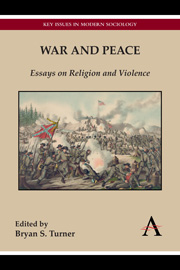Book contents
- Frontmatter
- Contents
- Acknowledgments
- Contributors
- Introduction by Bryan S. Turner
- War
- Chapter 1 Sacred Memory and the Secular World: The Poland Narratives
- Chapter 2 A Messianic Multiple: West Papua, July 1998
- Chapter 3 Lincoln, the Ministers of Religion and the American Jeremiad
- Chapter 4 Spiritual Violence: Max Weber and Norbert Elias on Religion and Civilization
- Peace
Chapter 4 - Spiritual Violence: Max Weber and Norbert Elias on Religion and Civilization
from War
Published online by Cambridge University Press: 05 May 2013
- Frontmatter
- Contents
- Acknowledgments
- Contributors
- Introduction by Bryan S. Turner
- War
- Chapter 1 Sacred Memory and the Secular World: The Poland Narratives
- Chapter 2 A Messianic Multiple: West Papua, July 1998
- Chapter 3 Lincoln, the Ministers of Religion and the American Jeremiad
- Chapter 4 Spiritual Violence: Max Weber and Norbert Elias on Religion and Civilization
- Peace
Summary
Introduction
In a famous passage from the Ynglingsaga, we hear about the comrades of Odin who “went without shields, and were mad as dogs or wolves, and bit on their shields, and were as strong as bears or bulls; men they slew, and neither fire nor steel would deal with them; and this is what is called the fury of the berserker” (Morris and Magnusson 1893, 1:16–17). This passage could usefully function as a preface to either The Civilizing Process or Economy and Society. We can interpret Norbert Elias's theory of the civilizing process as, amongst other things, a history of the decline of the warrior stratum in European feudalism and the rise of the court society. The emergence of a pacified court society and the technological development of weapons employing gunpowder eventually transformed the social functions and status of feudal warlords and their followers. These changes in civility also chart the formation of the nationstate and the centralization of institutional power. The transformation of the emotions is also an important feature of this history. In the discussion “On changes in aggressiveness,” Elias (2000, 161–2) provides an important account of how violent passions in the early feudal period were slowly regulated as the civilized forms of court society evolved.
- Type
- Chapter
- Information
- War and PeaceEssays on Religion and Violence, pp. 79 - 98Publisher: Anthem PressPrint publication year: 2013



